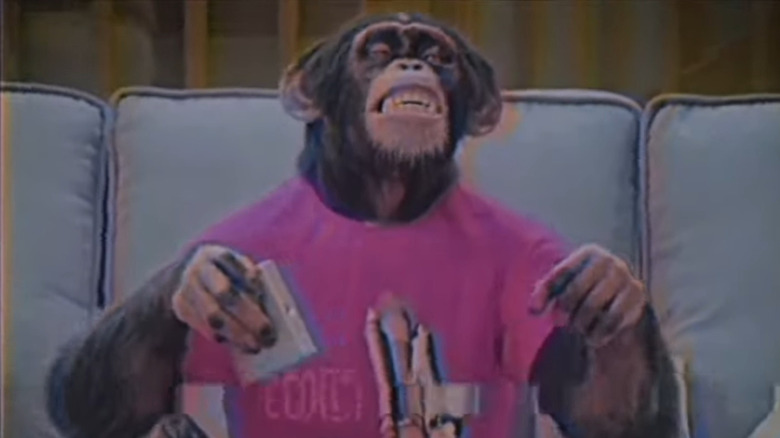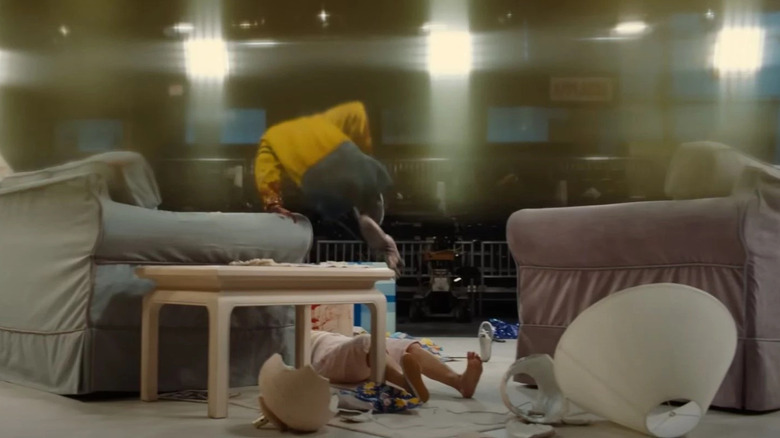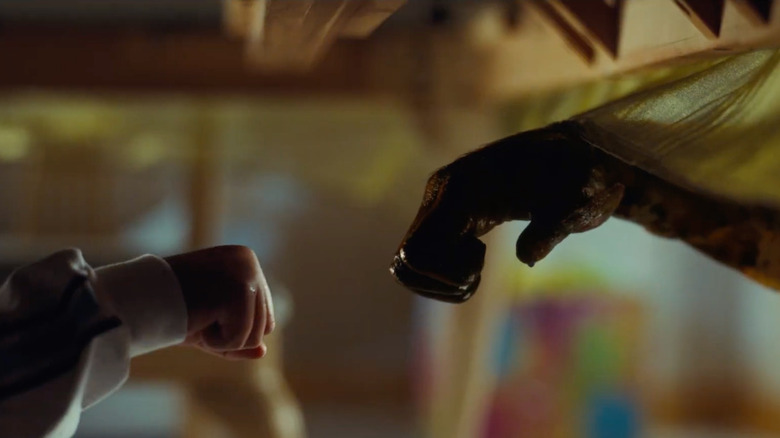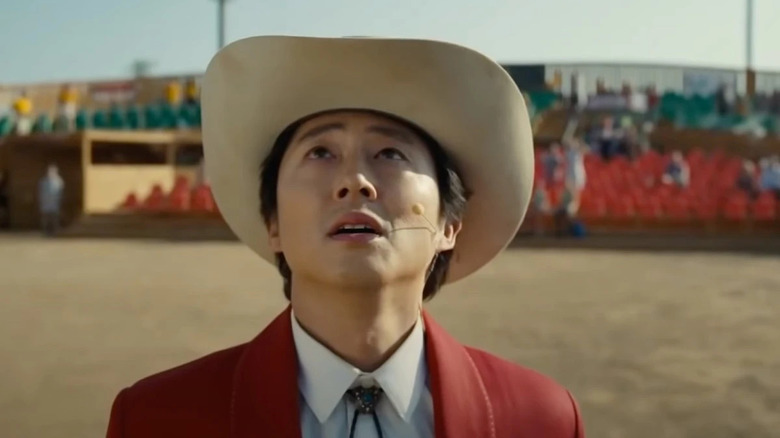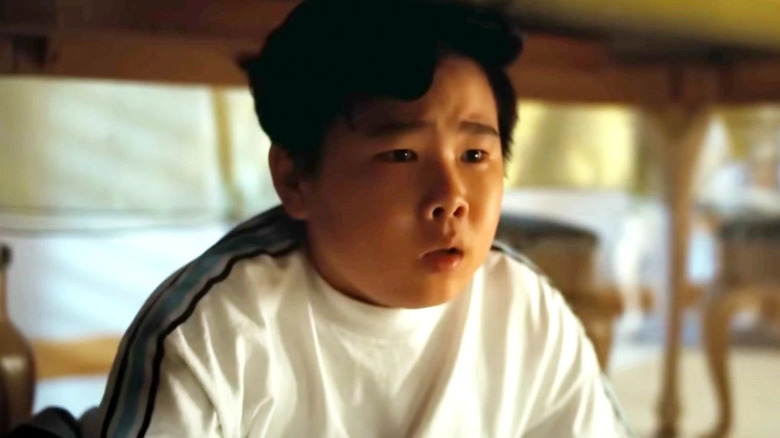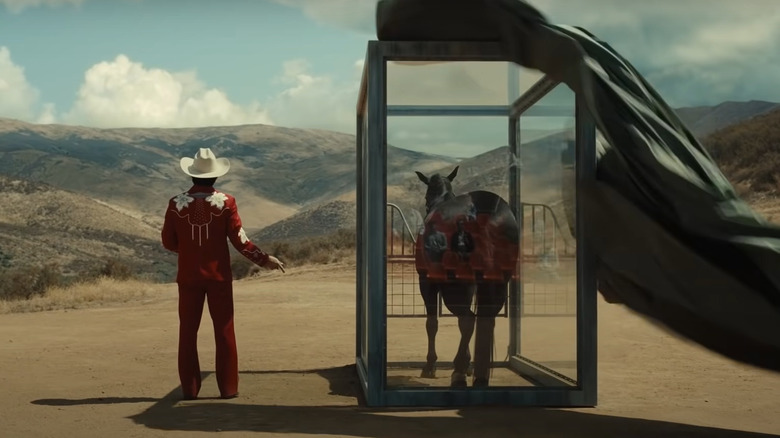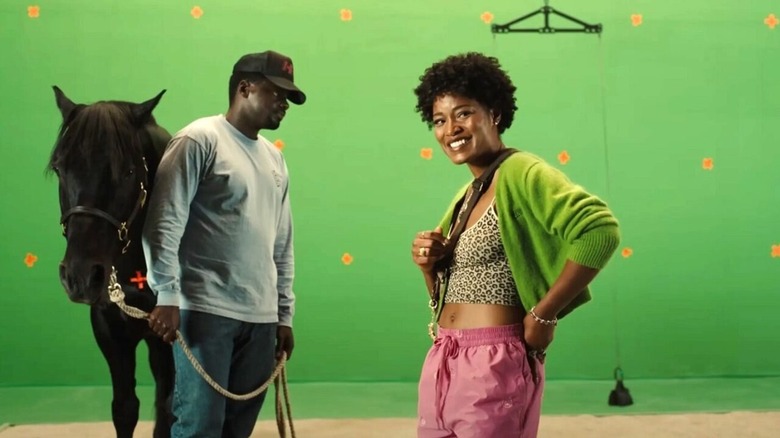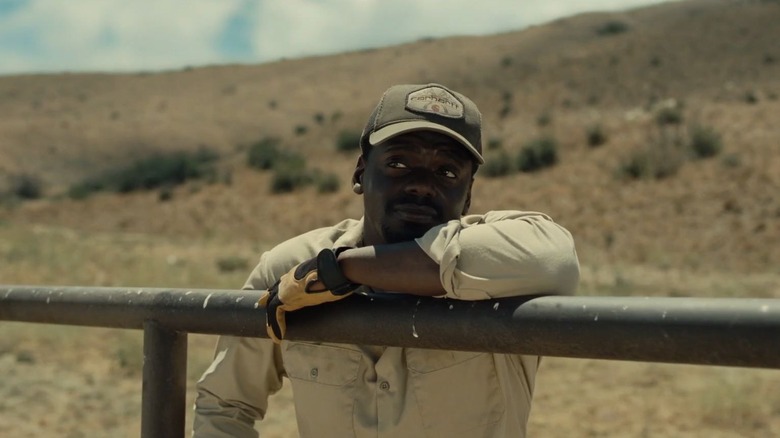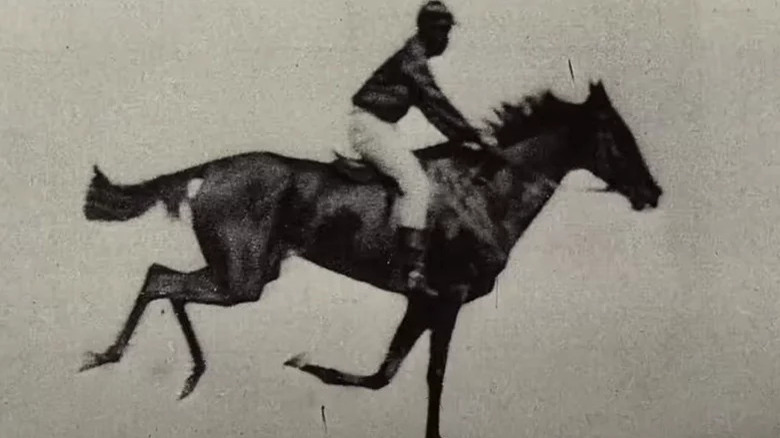The Gordy Scene Is Vital To Understanding What's So Great About Nope
This post contains major spoilers for "Nope."
Of all the complaints people have had about writer/director Jordan Peele's "Nope," the apparent "uselessness" of the "Gordy's Home" subplot is perhaps the most common. Why does a movie about aliens dedicate so much time to this chimpanzee? Gordy's meltdown on set is the first thing we see in the film, and it's a scene we return to multiple times throughout the movie. We learn that in 1998, there was a sitcom about a family with a chimpanzee called Gordy, and one day the chimp suddenly snapped and started attacking the actors. It violently mutilated the child actress Mary Jo Elliot (Sophia Coto), and left young Ricky "Jupe" Park (Jacob Kim) hiding terrified under the table as it continued its rampage.
Throughout Gordy's attack, we also get a glimpse of a strangely untouched shoe on the floor, standing upright at a seemingly impossible angle. Soon, Gordy notices Jupe under the table, and it seems for a moment like he's going to attack the kid like he attacked the others. Instead, Gordy seems to calm down enough to offer Jupe the fist bump their characters would give each other on the show. Then Gordy's shot in the head by the police, and the scene ends.
Soon after, adult Jupe (Steven Yeun) is eaten up by the alien, and neither he nor Gordy are explicitly mentioned again.
The disappointment
On first watch, most viewers probably thought these scenes would end up mattering a bit more to the main plot. Maybe Gordy was being controlled by the aliens. Maybe the upright shoe was some sort of clue about the nature of the aliens, something that would lead up to a really cool, mind-blowing reveal. And the mysterious opening scene with Gordy does seem to carry the implication that it will tie in more sensibly to the plot.
But the final act of the film comes and goes, and Emerald (Keke Palmer) and OJ's (Daniel Kaluuya) plan to get the perfect shot of the alien unfolds without any explicit influence from the Gordy story. On first watch, these flashbacks might seem like they were built up to be far more important than they actually were, like Peele simply thought of a cool idea and forgot to follow through on it.
But even though it never literally tied into the plot, the movie wasn't lying to the audience when it told us these scenes were important. The Gordy scenes aren't just necessary; they are vital to understanding the major themes of the movie.
The dangers of anthromorphism
The big mistake being made on the set of "Gordy's Home" and at the adult Jupe's theme park is the mistake of thinking you can exploit an animal without eventual consequences. In the present, Jupe thinks he's made some sort of agreement with the aliens because they come by at the same time each week to feast on his horse sacrifices. This leads him to hold a public event encouraging people to watch the sacrifice take place, not knowing that he's leading everyone at the park to their deaths. The UFO is not filled with intelligent human-like species who understand things like terms and conditions; like Gordy, it's a singular animal that can be set off by things beyond our understanding.
The alien responds aggressively when people look directly at it. Gordy, meanwhile, is triggered by the sudden popping of balloons. To a human, these triggers don't make a lot of sense, but you have to respect them anyway. The "Gordy's Home" producers think they've got an understanding of Gordy; they think they can put him on a set and put him in fancy clothes, and he'll go along with it simply because he's been going along with it so far. But at the end of the day, Gordy is an animal who can never fully communicate with us; he works by a different set of rules.
Thinking you can tame a wild animal
Child Jupe doesn't survive Gordy's rampage by running away or fighting off the animal. He survives by quietly hiding under the table. Notably, Jupe is distracted for a second by the upright shoe, so when Gordy first spots him under the table, they aren't making eye contact. Much like plenty of animals (and the alien, as we'd find out), chimpanzees often interpret eye contact as a form of aggression, which may be why the adult actor's attempts to calm Gordy down end so poorly.
So when Gordy spots Jupe under the table, the kid isn't making eye contact. Shortly after, when Jupe is in fact looking into Gordy's eyes, there's still the tablecloth between them, making it ambiguous as to how much Gordy's able to see Jupe's face. They cautiously begin to fist bump each other, but then Gordy's shot to death.
It's not clear what would've happened had the police not shown up at that moment, but the implication is that Gordy was finally calming down. At least, that's certainly Jupe's interpretation, because adult Jupe seems confident that he's able to keep the alien predictable and compliant. But at the end of the day, his belief that his fist bump was what tamed the wild Gordy was just an assumption, one that's later proven to be a deadly one.
The risk behind the reward
In the present day, Jupe speaks fondly of the spectacle of Gordy's meltdown. It became the basis for an apparently iconic SNL sketch, and people still pay him to see his "Gordy's Home" memorabilia. The event took what would've been a generic family sitcom with a mildly interesting gimmick and turned it into something people would remember for decades to come.
But as fondly as Jupe speaks about the event, we know the actual moment was horrifying for him. He was trapped under a table throughout Gordy's rampage, with no adults around to save him. It's not stated, but it's clear that this incident is a result of a failure of the people running the show to maintain basic safety. There should've been trained handlers at the scene, ready for this sort of scenario. There must've been hundreds of adults in the audience who all ran out the door; tiny child Jupe should never have been abandoned in such a situation for so long.
He's not the only survivor, though. As we learn in the present day, his child co-star Mary Jo Elliot also lived, but she has spent the rest of her life dealing with severe facial deformities that ruined her acting career. Whenever she goes out in public, she wears a veil over her face that's reminiscent of the tablecloth that shielded Jupe from Gordy's gaze.
Despite the many mistakes that went into what happened, and despite the mental and physical damage it did to the kids on set, the event may have been the best thing to happen to Jupe's career. It's the event he still centers his stardom around.
Getting that perfect shot
Another potential reason for why the upright shoe is so important: it's a cool, once-in-a-lifetime shot. It's technically not impossible for the shoe to land like that — maybe there was something behind it holding it up that Jupe couldn't see — but the fact that it happened by accident in the middle of such a violent event feels, well, like a bad miracle. And it's something that captures Jupe's attention, even though his attention should've probably stayed on the chimpanzee.
When people see something strange or spectacular, they want to look at it. When Em and OJ discover a UFO flying around, they want to take a picture of it. Getting that "Oprah shot" is more important to them than their lives, and multiple people end up dying in their pursuit of it. Jupe dies because he's also obsessed with spectacle, trying to capitalize on something new and exciting without fully understanding it. Likewise, two separate people die as part of Em and OJ's plan to get the aliens on film, and there are plenty of incredibly close calls. If these characters were wise, they'd simply leave the ranch, but they don't and they end up living to tell the tale.
So, what's the difference? Why does "Nope" punish Jupe for trying to cash in on the aliens but not OJ? It mainly has to do with OJ's respect for animals.
Respecting horses will save your life
As a direct contrast to the sort of set run by producers who think animals are nothing more than easy props, there's OJ. One of his earliest scenes shows him on a set with a bunch of people who don't treat his horse with the respect (and caution) it deserves. One woman stands directly behind the horse even though OJ warns her not to. One guy tries to get an up-close picture of the horse, leading the horse to see its own reflection in the camera and freak out, nearly kicking the woman who carelessly walked behind it. At one point, one of the people on set tells OJ to "tell the horse we're doing a take," as if the horse understands what a take is, or if it would even care if it did.
Much like the "Gordy's Home" producers, these people don't appreciate that animals go by their own rules, that they can't be treated the same way they'd treat a typical human crew member. If that woman had been in a slightly different position, the horse could've easily killed her with that kick.
OJ survives in the end because he's the first character to properly understand that the alien, while intelligent, doesn't think like a human. He understands that like his horses, the alien has an internal logic it abides by. They won't be able to get their Oprah shot unless they take the time to try to understand the alien's rules and work along with it, rather than try to bend the alien to their will. Perhaps most importantly, OJ's experience as an animal trainer gives him the context needed to understand the alien doesn't like to be looked at.
Don't look
Perhaps Peele's most notable directing choice made in the scene building up to Gordy's breakdown is the way the camera never actually shows us the chimp. We hear Gordy in the background, and we understand that he's in the room with the actors, but we're denied any glimpse of him in the moments leading up to his freak-out. When he does go berserk, the movie skips over the worst of it. We're denied the spectacle that drives Jupe's character, only focusing on the horror he felt in the immediate aftermath.
By doing this, the movie's making it's clearest condemnation of spectacle, arguing that the importance of capturing an exciting moment is nothing compared to the devastating toll the moment could wreak. It's a lesson Jupe fails to learn, which is why his embrace of spectacle gets him, his family, and everyone in his audience eaten alive. Gordy's disturbing death also highlights Jupe's cardinal sin: the fact that he's willing to sacrifice the horses to the aliens. Despite his connection to Gordy as a child, he feels no qualms over handing animals over to their deaths if doing so could bring him more money and fame. OJ never considers sacrificing his horses for a cool shot; Jupe never shows a moment of guilt over doing exactly that.
"Nope" is a movie with a lot of things to say about the exploitation that goes behind spectacle. As a child, Jupe watched Gordy be exploited, and then as an adult Jupe repeats the cycle with OJ's horses. But with OJ, Emerald and Angel (Brandon Perea), the only people they're exploiting are themselves. They aren't bringing out their horses as bait or bringing innocent families into the equation; they deserve to survive because they're risking themselves and themselves alone.
Embracing the ambiguity
It's more than possible that some of the connections made in this piece weren't intended by Peele, or that I'm missing plenty of other intended connections. The beauty of "Nope" — something mainstream movies should try to do more often — is that it leaves the viewer room to come up with their own interpretations. It's a movie that works best when you actively read between the lines.
People keep trying to compare Jordan Peele to other directors, like Christopher Nolan or (if they're feeling mean) M. Night Shyamalan, but perhaps the better alternative is the Wachowskis. Their claim to fame remains "The Matrix," a great movie, but one with a very accessible message and clear mainstream appeal (like Peele's "Get Out"). Since then, the Wachowskis have still been making great movies, but none of them have been quite as accessible or as universally acclaimed as their first home run — and that feels by design. In an interview for "Cloud Atlas," they talked about their love for movies that forced the audience to work for the answers. "Audiences go to the movies to turn off," Lilly Wachowski said, "And we don't want to turn off when we go to the movies. We don't want a passive moviegoing experience ... we want to participate."
Although Peele's work is still generally better received than much of the Wachowskis' later output, the trend of embracing less accessible, more ambiguous storytelling is clear in his first three films. It may disappoint those who loved "Get Out," a film where nearly every question raised had a clear, literal answer, but it's still refreshing to see a mainstream film that's comfortable with ambiguity. "Nope" doesn't give you a single, clear-cut answer for why Gordy is so important, and that's what makes the movie so good.
